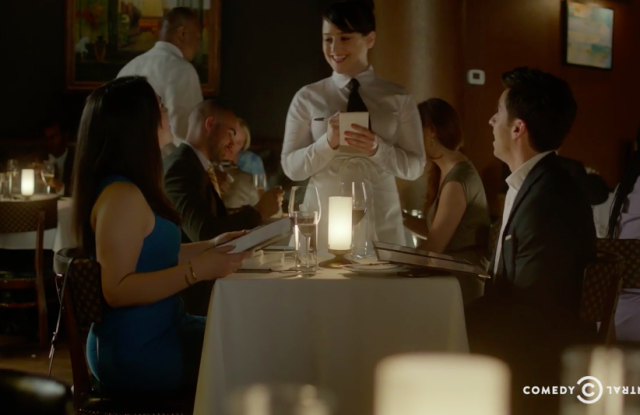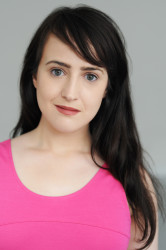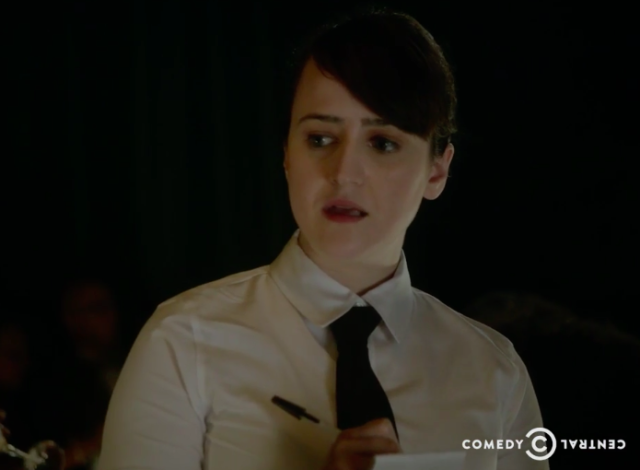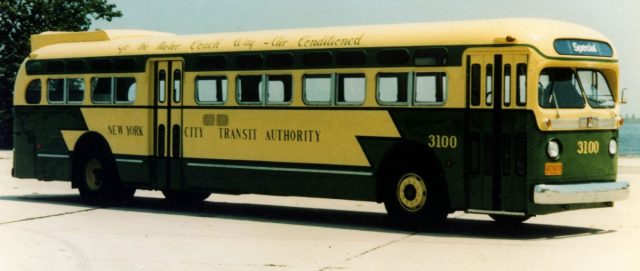
This season, Broad City has been doing what a lot of us would probably do with our own TV shows: paying homage to our favorite 90s movies. Episode 3 included tributes to both The Sandlot and Sister Act 2, complete with a Whoopi Goldberg cameo. This week’s episode went for a full-on, nearly beat-by-beat recreation of the climax of Mrs. Doubtfire — the scene in the restaurant with Robin Williams’ character running back and forth between two tables, except this time it’s Abbi running between Ilana’s parents’ anniversary dinner and a secret date with Trey, her Soulstice boss/new hookup pal.
Whoopi’s Sister Act 2 cameo was hard to miss, but this scene contains a Mrs. Doubtfire cameo some viewers might overlook: Mara Wilson, who as a bright-eyed 6-year-old played the youngest daughter in the movie, plays the waitress in the restaurant. It’s a rare appearance for Wilson, now 28 and a writer and performer in the New York theater and storytelling scene: She notably pushed away from acting after aging out of kid roles, and has tried to distance herself from being known as “that girl from Matilda” ever since.
But, she told Brokelyn, the cameo was actually her idea: Like many women her age, she’s a fan of the show, and she saw it as a chance to dip a toe into embracing those childhood roles that made her famous, while still moving forward with her career. Here’s how it happened:
So we know that you haven’t done much acting since you were a child star, and you’ve kind of pushed back from that image as an adult performer. How was the opportunity to be on Broad City presented to you?
 |
I have no interest in pursuing an actual acting career. The only times I do act are when it’s with friends, or when it’s a project I really like. I’m not going to be going out there auditioning for things all the time. I do still do voiceover work, because that’s really fun for me.
I procrastinated watching Broad City, and when I finally did about a year ago, I was like, “Holy shit, this show is amazing.” I had friends in common with Ilana [Glazer, co-creator and star] and we’d met briefly at NYU. We once bumped into each other in the elevator and I offered her some chapstick. I followed Abbi [Jacobson, the other co-creator and star] on Twitter, and she sent me a message saying, “That’s really weird that you followed me today, because we are working on an episode right now that’s an homage to Mrs. Doubtfire.” I felt emboldened a few days later, I think it was after a glass of wine, and I said, “You know, if you want me to make a cameo or something on this, I totally would. I don’t act much, I don’t really like film or TV acting, but this would be really fun and I have a lot of respect for you two.” They were like, “Totally, we’d love to have you on.” They were both really excited. Ilana sent me a “Yes, yes kween!” email.
People would probably be surprised to hear that it was your idea to appear on the show.
I’ve had three or four different friends appear on it this season. I was at a party the other night and I was talking to one of my friends, and I was like, “Hey, I saw you on Broad City last week, I’m gonna be on it next week.” And another friend came up and I said, “Hey, you were on Broad City a week ago, weren’t you?”
One of my friends, Jonathan Braylock, who was on it, said “It’s becoming like the Law and Order of the New York comedy scene.”
Were you at all nervous or hesitant about wading back into this role after trying to separate yourself from your child actor days for so long?
I went through a very long phase of trying to distance myself from it. It was kind of a prolonged adolescence I would say, where I wanted to assert myself, I wanted to be an adult, and I didn’t want to be associated with that image anymore. But I’m always going to be associated with that image, and I might not want to be reduced to that image, but I’m always going to be associated with it. So I’m working on embracing it.
There’s a line between pushing yourself away from it and using it to an absurd degree, and sort of riding off the accomplishments you had 20 years ago. I’m trying to walk that line. But this was a movie that did do a lot for me, and it was an homage to a really funny scene and it was done by people who I liked and respected creatively.
[Here’s a side by side gif comparison of the scenes, for reference]


What was being on the set like?
It felt good being there. There were also times being on the set where I was like, oh right, filming takes a long time. It’s not the best job for a control freak like me. It took two days to film it. They kept apologizing the whole time, saying we’re so so sorry, this is taking so long. And I said, “You know, the original scene took two weeks to film, so you really don’t need to worry about it.”
After Robin Williams died in 2014, you wrote a bit about what he meant to you on the set of Mrs. Doubtfire, and that you wished you had reached out to him more when he was still alive. Did going back into the Mrs. Doubtfire world make you emotional about that at all?
I think that Robin dying was another thing that made me realize that I’d been pushing myself away from my past and not embracing it. I’m not gonna be the kind of person who goes to a restaurant and says, “Don’t you know who I am? I was that little girl in that movie.” That’s not me.
I still get shy about it when people ask me, but I think that it’s something I realize I do have such fond memories of. It didn’t feel heart-wrenching or difficult to be there. It was a pleasant experience, and a nostalgic one.
Broad City is important to me
— Mara “Get Rid of the Nazis” Wilson (@MaraWilson) February 17, 2016
For people who don’t know, you’ve spent a lot of your time lately doing your storytelling show and working on plays. What do you like about those over acting?
I like that I can say what I want to say, I like that it’s my words. The thing about film acting is, it’s very much the director’s needs. The director is god in that situation. I was always second guessing myself, I felt a little uncomfortable. There were some directors, [Matilda director] Danny DeVito in particular, who wanted to keep me involved the whole time, and didn’t make me feel like a kid. That usually didn’t happen.
That’s why I do like the stage: it’s me in control, it’s me ultimately having final say over my performance. And what material I do or say on stage, and that’s terrifying but also exciting.

Have you ever waited tables, like your character in Broad City?
It is the one service job I haven’t done. I’ve done so many service jobs. People think, “Oh you were a millionaire from your movies,” but that’s not true. Even if I had been, my parents were very strict. They were like, no, you need to be working these jobs, you need to be humble.
I was a barista, I was a cashier, I was a tutor, I was a nanny for years. I’ve worked at a box office. I’ve done like every service job except waitressing, though I did serve food at a wedding once.
How often do you get recognized around town?
It’s usually always from the same age group, it’s usually young women I’d say 18-25. It almost always happens when I’m shopping. There are times when I’m waiting for the train, and I’ll see a group of girls and I’ll be like, one of them is going to recognize me, it’s going to happen. It’s nice, it’s really flattering. It happens a lot when I’m sick, when I’m really tired; I’ll have just gotten off a plane and people will be like, “Hey, you know who you look like?”
Catch Mara Wilson’s show, What Are You Afraid Of?, which is moving to QED in Astoria next month (check back here for details); her memoir, Where Am I Now? comes out in September and is available for pre-order now. Find her on Twitter: @MaraWilsonWritesStuff.
Don’t forget to read our recap of this Broad City episode too.
Never miss a Brokelyn scoop: subscribe today!
Follow Tim, who is embracing his own past (of bad tweets): @timdonnelly.
Leave a Reply



